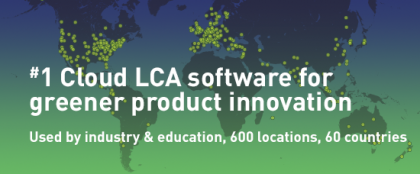Thank you for making Sustainable Minds the #1 Cloud LCA software for greener product innovation – now used in 600 locations in 60 countries. We are excited to bring you SM v3.0.
Sustainable Minds’ easy-to-use, standardized Life Cycle Assessment solution makes it possible for manufacturers across the value chain – large and small – to dynamically evaluate, compare and improve their products' environmental performance by integrating life cycle thinking and LCA into their product development processes. The company has been recognized by Gartner® in its 2013 Cool Vendor Report, in Product Design and Life Cycle Management, as 'innovative, impactful and intriguing.'
Now with SM v3.0, Sustainable Minds can partner with manufacturers to get visibility for your brand and make your product data available to manufacturers, consultancies, educators & students worldwide.
Ultimately, every end product manufacturer will require its suppliers to make environmental performance information available, to make it easy for them to quickly evaluate environmental performance and make trade-off decisions to make credibly greener products.
Sustainable Minds is making it easy and cost-effective for raw material and component manufacturers to get ready to meet their customers’ reporting requirements and win their business – get started now.
What’s new in SM v3.0:
1. Your data, Branded Data
-
An expanded dataset for the Nonwovens Industry, over 350 impact factors for bio-based oils, organic chemical, inorganic chemicals and fibers. Learn more about SM’s industry sponsor INDA, the global association for the Nonwovens Industry, and building the first industry-defined lifecycle dataset for nonwovens. sustainableminds.com/nonwovens
-
Branded Data Program – the innovative next phase in SM’s Custom Data Creation Program. Manufacturers across the value chain can quickly get their new greener materials information in front of customers who care. The first offering includes visibility in the data browsing and selection process.
2. New data: SM2013, a major update to SM’s impact assessment methodology combines TRACI 2.1 and LCI data from the current version of ecoinvent and other sources for more globally harmonized LCA results.
- You can continue modeling in current projects using SM2011 – no change.
- You can copy and upgrade a project to SM2013.
- All NEW projects will use SM2013.
SM2013 uses the latest TRACI 2.1 release and new normalization factors that were developed specifically for TRACI 2.1. As you work on projects using SM2013 you will notice that the impact factor scores are smaller than those in SM2011. The primary reason is that the toxicity impact categories have been generated with a recently published methodology called USEtox™, now the most recognized toxicity impact assessment method. It is a global model and includes everything that toxicologists and LCA experts agree on. This has a downward impact on the results, which are most noticeable in the end-of-life impacts. You will also find that some impact categories have gained importance, most noticeably, the relative contributions of fossil fuels and global warming.
All in all we see a more balanced result views. Visit the Learning Center for a complete update and SM2013 methodology report.
| SM2011 |
> SM2013 |
Five TRACI impact category names have changed from SM2011 to SM2013. |
| Ecological damage |
| 1. Acidification |
Acidification |
| 2. Ecotoxicity |
Ecotoxicity |
| 3. Global Warming |
Global Warming |
| 4. Ozone Depletion |
Ozone Depletion |
| 5. Smog |
Smog |
| Human health damage |
| 6. Human Carcinogens |
Carcinogenics |
| 7. Human Respiratory |
Respiratory Effects |
| 8. Human Toxicity |
Non-carcinogenics |
| Resource Depletion |
| 9. Fossil Fuel |
Fossil Fuel Depletion |
| 10. Water Eutrophication |
Eutrophication |
This time article from MIT & Deloitte illustrate the business benefits of manufacturers providing suppliers with tools and processes to help achieve sustainability goals.
MIT Sloan Management Review
Big Idea: SustainabilityBlog | May 13, 2013
Sustainability Goals — Thinking About What Works and What Doesn’t
New research shows which sustainability practices have a statistically significant impact on the overall success of the sustainable value-chain initiatives measured, their cost savings, and their revenue impact (see Figure 1).







 Feed: blog
Feed: blog